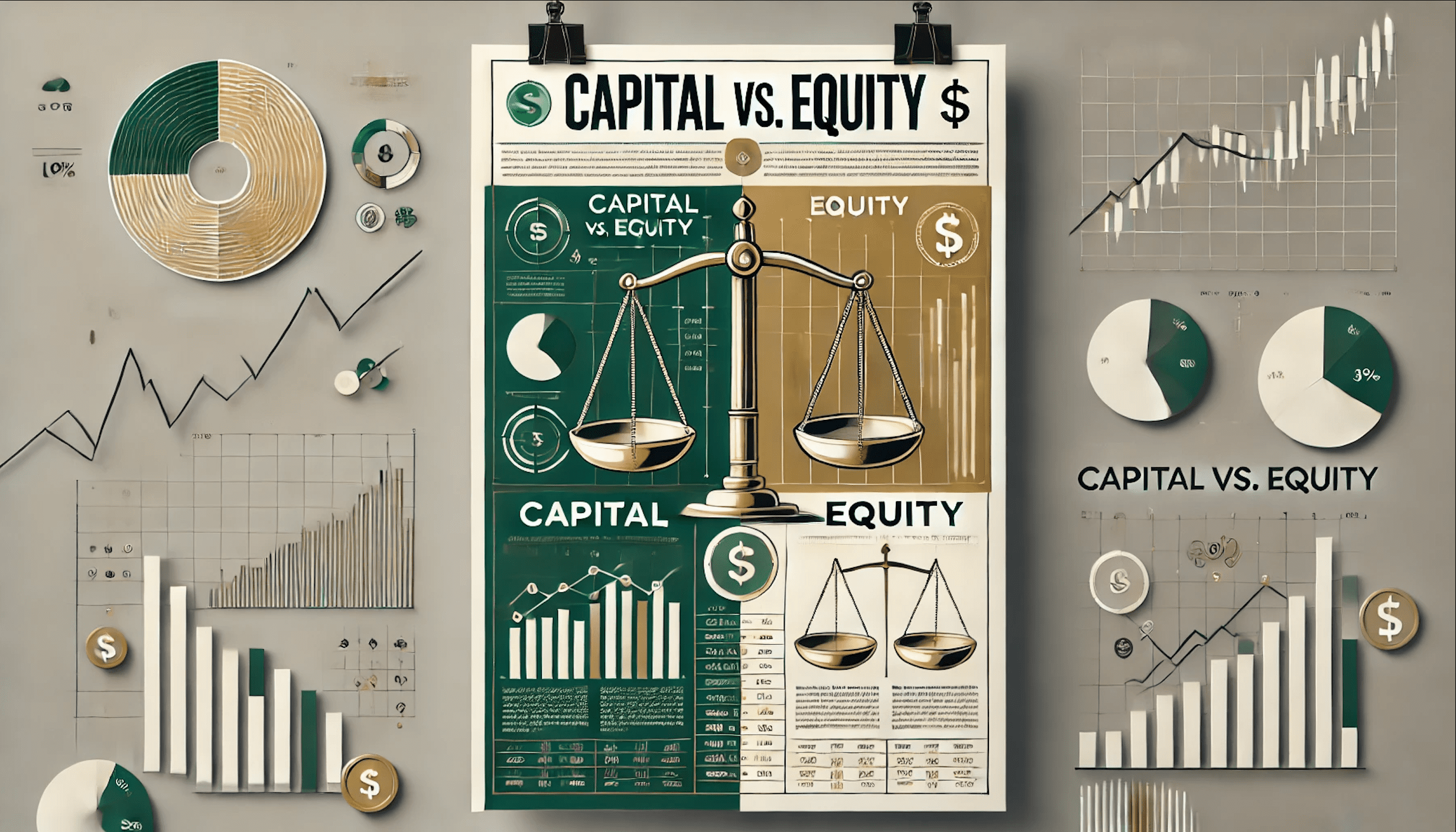Capital vs. Equity: Understanding the Key Differences
Capital and equity are foundational concepts in finance, essential for business growth and investment decisions. This blog distinguishes between capital and equity, exploring their definitions, types, and roles within a company. By understanding these concepts, businesses and investors can make informed decisions that enhance financial stability and growth potential.
Abhinil Kumar
Author

In the dynamic realm of finance and business, the distinction between capital and equity forms the backbone of strategic decision-making. These pivotal concepts drive the engine of company growth, investment potential, and financial stability. But what exactly sets them apart? Why are they so essential to both businesses and investors? In this blog, we delve deep into the world of capital and equity, unraveling their definitions, types, and roles within a company. With this knowledge, you’ll gain a sharper insight into the financial mechanics that fuel success, enabling you to make savvy, strategic decisions that propel your business or investment portfolio forward. Get ready to unlock the secrets of capital and equity and transform your financial understanding!
What is Capital?
Capital refers to the financial resources a company uses to fund its operations, growth, and investments. It can come from various sources, such as investments from owners, loans from financial institutions, or retained earnings. Capital is essential for businesses as it provides the necessary funding for day-to-day operations, expansion, and investment in assets. It can be further classified into different types, including debt capital and equity capital.
Types of Capital
Debt Capital:
Debt capital refers to funds borrowed by a company that need to be repaid with interest over a specified period. This type of capital is typically obtained through loans and bonds issued by banks, financial institutions, or individual investors. Debt capital allows companies to finance their operations without diluting their ownership.
Example: A company borrows $1 million from a bank at an interest rate of 5% per annum, to be repaid over 5 years. The company will pay back the $1 million principal plus interest, amounting to regular payments over the loan term.
Advantages:
- No Ownership Dilution: Borrowing does not affect the company’s ownership structure.
- Tax Benefits: Interest payments on debt can be tax-deductible.
- Predictable Payments: Fixed interest payments provide clarity on financial obligations.
Disadvantages:
- Repayment Obligation: The company must repay the principal and interest, regardless of its financial situation.
- Interest Costs: Interest payments can be substantial, increasing the cost of capital.
- Impact on Credit Rating: High levels of debt can negatively impact the company’s credit rating, making future borrowing more expensive.
Key Characteristics:
- Requires regular interest payments.
- Must be repaid within the agreed term.
- Creditors have no ownership rights in the company.
Equity Capital:
Equity capital represents funds raised by a company through the sale of shares. This type of capital comes from investors who purchase company stock, thereby becoming part-owners. Equity capital does not need to be repaid, but it does dilute ownership and often requires sharing profits in the form of dividends.
Example: A startup company raises $2 million by issuing shares to venture capitalists. These investors receive a percentage of ownership in the company and may earn returns through dividends or by selling their shares at a higher price in the future.
Advantages:
- No Repayment Obligation: Unlike debt, equity does not have to be repaid.
- Lower Financial Risk: Since there are no fixed repayments, the company has more financial flexibility.
- Additional Resources: Equity investors often bring valuable expertise, connections, and guidance.
Disadvantages:
- Ownership Dilution: Issuing new shares dilutes the ownership percentage of existing shareholders.
- Profit Sharing: Shareholders expect dividends or capital gains, which means sharing a portion of profits.
- Potential for Conflict: Different stakeholders might have conflicting interests or visions for the company’s future.
Key Characteristics:
- No repayment required.
- Ownership rights are granted to shareholders.
Role of Capital in Business
Capital is the lifeblood of any business. It provides the financial resources necessary for operations, expansion, and long-term growth. Here are its primary roles:
- Funding Operations: Ensures that a company can cover its operational expenses, such as payroll, utilities, and inventory.
- Enabling Growth: Allows businesses to invest in new projects, research and development, and market expansion.
- Enhancing Stability: Provides a buffer to withstand economic downturns and unexpected financial challenges.
What is Equity?
Equity represents the ownership interest in a company. It is the residual interest in the assets of the company after deducting its liabilities. Equity holders, also known as shareholders or stockholders, have a claim on the company’s assets and earnings in proportion to their ownership stake. Equity can be obtained by issuing shares of stock to investors or by reinvesting the company’s profits.
Types of Equity
- Common Stock:
Common stock represents ownership in a corporation and provides its holders with voting rights and a share in the profits. Common stockholders have the potential to benefit from the growth of the company as well as receive dividends, which are a portion of the company’s profits distributed to shareholders. They also have the right to attend shareholder meetings and vote on company matters.
- Key Characteristics:
- Voting rights in company decisions.
- Potential to receive dividends.
- Higher risk compared to preferred stock.
- Key Characteristics:
- Preferred Stock:
On the other hand, preferred stock is a class of stock that provides certain advantages to shareholders compared to common stock. Preferred stockholders have a higher claim on the company’s assets and earnings, meaning they receive priority when it comes to dividends and distribution of assets in the event of liquidation. They also typically have a fixed dividend rate, which means they receive a set amount of dividends before common stockholders.
Preferred stockholders do not usually have voting rights, they do not have a say in the company’s management or policies. However, they have a lower risk than common stockholders as they are entitled to receive their dividend payments before any dividends are paid to common stockholders.
- Key Characteristics:
- Fixed dividend payments.
- Higher claim on assets in liquidation.
- Generally, no voting rights.
- Key Characteristics:
Role of Equity in Business
Equity plays a critical role in financing a company and determining its value. Key functions include:
- Providing Capital: Equity financing is a significant source of funding for businesses, allowing them to raise money without incurring debt.
- Distributing Ownership: Shares of equity represent ownership stakes, giving investors a say in the company’s management and a share of its profits.
- Valuing the Company: The equity value, or shareholders’ equity, is a measure of a company’s net worth and financial health.
Capital vs. Equity: Key Differences
1. Ownership and Control
Capital:
- Includes Both Debt and Equity: Capital encompasses funds obtained through both borrowing (debt) and selling ownership stakes (equity).
- Debt Capital Does Not Confer Ownership Rights: Creditors who provide debt capital do not gain ownership or control in the company; they are entitled only to loan repayment with interest.
Equity:
- Represents Ownership in the Company: Equity capital involves selling shares of the company, giving investors ownership stakes.
- Shareholders Have Voting Rights and a Say in Company Decisions: Shareholders, as part-owners, can vote on major company decisions and influence corporate policies.
2. Financial Obligations
Capital:
- Debt Capital Must Be Repaid with Interest: Borrowed funds create a legal obligation to repay the principal amount plus interest, regardless of the company’s financial performance.
- Creates a Financial Obligation to Creditors: Regular interest payments and eventual repayment of the principal amount are mandatory, impacting cash flow and financial stability.
Equity:
- No Repayment Obligation: Unlike debt, equity capital does not have to be repaid, providing more financial flexibility.
- Dividends Are Paid at the Company’s Discretion: While shareholders expect returns, dividends are not obligatory and are paid only if the company decides to distribute profits.
3. Risk and Return
Capital:
- Debt Capital Carries Lower Risk for Investors but Requires Regular Interest Payments: Creditors face lower risk as they are prioritized for repayment and receive regular interest payments, but this creates an ongoing financial burden for the company.
- Debt Increases Financial Risk for the Company: High levels of debt can strain a company’s finances, especially during economic downturns.
Equity:
- Higher Risk for Shareholders but Offers Potential for Higher Returns: Equity investors take on more risk as their returns depend on the company’s profitability, but they can benefit significantly from dividends and stock price appreciation.
- Potential for Capital Gains: Shareholders can profit from the increase in the company’s stock value over time, leading to significant financial gains.
4. Impact on Financial Statements
Capital:
- Appears on the Balance Sheet as Both Liabilities (Debt) and Equity: Debt capital is listed under liabilities, while equity capital appears under shareholders’ equity, showing the company’s financial obligations and ownership structure.
- Affects the Company’s Debt-to-Equity Ratio: The balance between debt and equity impacts key financial metrics, influencing investor perception and borrowing capacity.
Equity:
- Appears on the Balance Sheet Under Shareholders’ Equity: This section reflects the net worth of the company attributable to shareholders, indicating financial health and stability.
- Indicates the Net Worth of the Company: Equity represents the residual interest in the assets of the company after deducting liabilities, providing insight into the company’s value.

Capital vs. Equity: Key Differences
Conclusion
Understanding the distinctions between capital and equity is fundamental for both businesses and investors. Capital encompasses all financial resources used to fund a company’s operations and growth, while equity specifically refers to ownership stakes in the company. Recognizing the nuances between different types of capital and equity can aid in making informed financial decisions, ensuring effective financial management, and optimizing investment strategies. Whether dealing with equity investors, managing accounts payable, or evaluating the cost of debt versus equity, a clear grasp of these concepts is essential for achieving long-term financial stability and success.
FAQs
-
**What is the difference between equity investors and debt investors? **Equity investors provide capital in exchange for ownership stakes in the company, gaining voting rights and a share in the company’s profits. In contrast, debt investors lend money to the company and are repaid with interest, but do not gain ownership or voting rights.
-
**How does the cost of debt compare to the cost of equity for a public company? **The cost of debt typically involves lower interest rates and is tax-deductible, making it cheaper in the short term. However, the cost of equity involves giving up ownership and potential dividends to shareholders, which can be more expensive in the long run due to the expectation of higher returns by equity investors.
-
**What role do voting rights play in common stock compared to preferred shares? **Common stock holders usually have voting rights, allowing them to influence corporate decisions and elect the board of directors. Preferred shares generally do not provide voting rights but offer priority in dividend payments and asset liquidation.
-
**How do accounts payable affect a company’s working capital and overall financial health? **Accounts payable are short-term liabilities that need to be managed effectively to maintain positive working capital. Efficient management of accounts payable ensures that the business entity has enough liquidity to cover its short-term obligations, reflecting healthy cash flow and financial stability.
-
**What are the key differences between public companies and private companies regarding equity investment? **Public companies have shares traded on stock exchanges, making it easier for equity investors to buy and sell shares. Private companies do not have publicly traded shares, which can make equity investments less liquid and potentially harder to value, but they often provide more control and closer relationships with investors.


